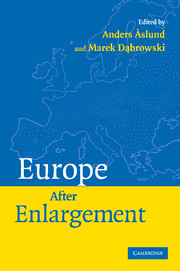Book contents
- Frontmatter
- Contents
- List of Charts, Tables, and Boxes
- Contributors
- Acknowledgments
- Introduction
- 1 Has Europe Lost Its Heart?
- 2 Economic Implications of the Social Provisions of the Stalled EU Constitution
- 3 Fiscal Policy and Fiscal Rules in the European Union
- 4 Design and Implementation of the Stability and Growth Pact: The Perspective of New Member States
- 5 Perspectives on the Lisbon Strategy: How to Increase European Competitiveness
- 6 Is Europe Reforming? Evidence from Cross-Country Structural Indicators
- 7 Recovery Growth as a Stage of Post-Socialist Transition
- 8 Comparative Oligarchy: Russia, Ukraine, and the United States
- 9 The Economic Rationale of the “European Neighbourhood Policy”
- 10 Economic Integration of Eurasia: Opportunities and Challenges of Global Significance
- Index
Introduction
Published online by Cambridge University Press: 04 December 2009
- Frontmatter
- Contents
- List of Charts, Tables, and Boxes
- Contributors
- Acknowledgments
- Introduction
- 1 Has Europe Lost Its Heart?
- 2 Economic Implications of the Social Provisions of the Stalled EU Constitution
- 3 Fiscal Policy and Fiscal Rules in the European Union
- 4 Design and Implementation of the Stability and Growth Pact: The Perspective of New Member States
- 5 Perspectives on the Lisbon Strategy: How to Increase European Competitiveness
- 6 Is Europe Reforming? Evidence from Cross-Country Structural Indicators
- 7 Recovery Growth as a Stage of Post-Socialist Transition
- 8 Comparative Oligarchy: Russia, Ukraine, and the United States
- 9 The Economic Rationale of the “European Neighbourhood Policy”
- 10 Economic Integration of Eurasia: Opportunities and Challenges of Global Significance
- Index
Summary
Over the last fifty years Europe has gone through a unique historical process of economic and political integration, sharply contrasting with the tragic first half of the twentieth century. The last fifteen years, in particular, have brought remarkable progress. The Single European Market and the common currency (euro) have significantly deepened the prior integration, which was limited to little more than trade. Meanwhile, the European Union (EU) has gone through subsequent enlargements. The latest and biggest enlargement of the EU in May 2004 expanded the number of member states from fifteen to twenty-five. As a consequence, the EU's economic and geopolitical importance has increased. Most of Europe's nations and population are now contained in the Union.
Several other countries are in various stages of EU accession (Bulgaria, Romania, Turkey, and Croatia) or would like to start this process in the not too distant future (western Balkans, Ukraine, and Moldova). The Rome Treaty established that all European countries have the right to apply for EU membership, signaling that future EU borders will move farther to the east and southeast.
Despite the obvious achievements of integration, the European economy and European institutions face serious challenges. This volume concentrates on five big ones. The first task for the EU is to find a new legal shape and adopt a European Constitution. The EU decision-making process is ineffective and lacks sufficient democratic legitimacy on the European level.
- Type
- Chapter
- Information
- Europe after Enlargement , pp. 1 - 5Publisher: Cambridge University PressPrint publication year: 2007

